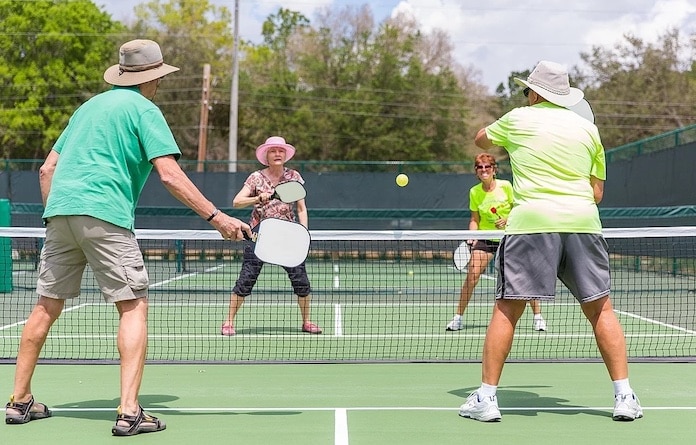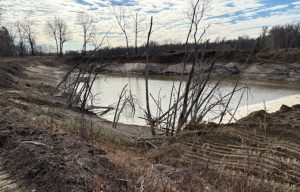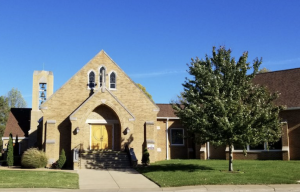Pickleball discussed in Columbia

The Columbia Parks and Recreation Advisory Board had something unexpected at its June 22 meeting: an audience.
The first meeting of the newest board members for the current term met to discuss permanently converting a tennis court at Metter Park into a pickleball court, and the public input on the matter was overwhelmingly in favor of the proposition.
One standard size tennis court can be converted into two pickleball courts.
Columbia resident Scott Jackson was the first to speak. He said he was “excited to hear” the city was considering establishing a pickleball presence in the community. As a teacher in St. Louis, he noted that younger people love pickleball as well and a court would bring “all ages together.”
John Kleinschmidt, another Columbia resident who also recently became an accredited pickleball instructor, expressed a desire for the city to expand beyond the proposed Metter Park courts.
Jackson and Kleinschmidt said they have been using existing courts by temporarily adding chalk lines to create pickleball boundaries.
Kleinschmidt claimed pickleball is the “fastest growing sport” in the country, adding it is a “great sport for all ages” and an “inclusive” sport regardless of athletic ability.
Both Jackson and Kleinschmidt remarked that the sport offers an opportunity to get a good workout without the stress that a comparable sport such as tennis puts on the body. They also noted it is a game people with physical restrictions can still enjoy, especially in doubles play.
“I can go play (pickleball) for three hours and still be able to walk the next day,” Kleinschmidt remarked.
Pickleball is similar to ping-pong in its rules, the major difference being that it is played on a court rather than a table with a plastic baseball-sized sphere with holes throughout. The rackets are slightly smaller than tennis rackets.
Jackson and Kleinschmidt also commented that the pickleball community travels well, and that tournaments in different cities are always full.
Kleinschmidt reported that the nation’s largest indoor pickle court, an 18-court facility, is being planned for Gravois Bluffs in Fenton, Mo.
When asked about the possibility of converting tennis courts at Bolm-Schuhkraft Park, Columbia Director of Community Development Scott Dunakey said permanent conversion of the existing courts would not be possible, as the city has an agreement with the Columbia School District for school use of tennis courts and that the Metter Park conversion would be a good way to gauge public interest in the sport.
Kleinschmidt and others also asked about the possibility of the city developing a tournament-capable pickleball facility in the future if there was enough interest.
“I travel to different places for tournaments and spend my money there. I’d like to be able to have people come (to Columbia) and spend their money,” Kleinschmidt explained.
Dunakey said the city would be developing a new comprehensive plan this summer and that input about recreational activities such as pickleball would be taken into consideration.
The park board voted unanimously in favor of recommending to the Columbia City Council conversion of the Metter Park tennis court into two pickleball courts.
Dunakey then addressed the park board regarding its role in the upcoming comprehensive plan. The plan will ask for community feedback in order to anticipate growth in Columbia over the next 20 years. It will assess “available resources, opportunities, potential constraints and community preferences” in order to develop standards for residential, commercial and industrial development as well as to determine plans to keep “infrastructure and municipal services at expected service levels.”
Dunakey explained the park district component of this upcoming comprehensive plan will be “beefed up” this time around for two reasons.
First of all, COVID restrictions and material shortages halted much of planned park work in the city during 2020.
Dunakey updated the board on Columbia City Engineer Chris Smith’s recent report that the city refunded grant money for the Creekside Park project due to COVID restrictions and the Illinois Department of Natural Resources being unwilling to make concessions regarding scope and timing for project grants.
Dunakey noted that the city is still eligible to reapply for grant funding and the project is not off the table.
On a positive note, Dunakey gave an overview of video gambling revenue in the city, which is earmarked specifically for park development and maintenance.
In all of 2019, total video gambling revenue collected for the park district was roughly $104,000.
Even though the COVID pandemic “hampered funds,” the city reported almost $56,000 collected in 2020 despite gaming machines being completely disable for several months throughout 2020.
Dunakey noted the revenue in 2020 was actually higher when averaged monthly and that expected revenue from gambling sources is “trending upwards” already in 2021.
This increase in funding and an anticipated desire for increased park space and amenities make public input to the upcoming comprehensive plan vital to the direction Columbia takes in that regard.
The city will provide updates on its website (columbiaillinois.com) and social media outlets while it finalizes project details. Residents are also asked to contact Dunakey by emailing sdunakey@columbiaillinois.com or calling 618-281-7144, ext. 118.
In other business, a slate of officers was elected for the board. Former vice-chairman David Bernhard was elected chairman. Former chair Joe Sander resigned the post and committee in February.






